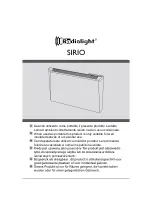
15
3.5.2 Fuel suction from an additional fuel tank.
Consider convenience of fuelling, when
installing the fuel tank (Fig.14). Install the
fuel tank in such a way that the amount of fuel
and its potential leaks from the inlet, fuel
suction nozzle or connections can be visually
controlled. The fuel, which may leak when the
fuel tank is filled, must not get on the exhaust
system, wiring or other object, which can be
damaged due to their contact with fuel.
Fig. 14 – Installation of the fuel tank
3.5.3 Installation of the fuel pump and the fuel supply line.
The fuel pump is connected to the heater through its own harness and supplies fuel
depending on the required heat capacity to the combustion chamber of the heater. When
running, the fuel pump makes characteristic metallic clicking noise.
It is preferable to install the fuel pump
closer to the fuel tank and below the low level
of fuel. To prevent leaks of fuel from the fuel
tank (by gravity), if sealing of the fuel pump
is compromised, it is preferable to place a fuel
tank so that the maximum fuel level is below
the cut on the fuel tube of the heater. The
position of the fuel pump is space must be as
per Fig.15.
-
a – fuel extraction height up to 70 cm;
-
b – Maximum height difference (fuel rise)
between the fuel pump and the heater, up
to 1.5 meters
.
Fig. 15 – Working position of the fuel pump
Attach the fuel pump to the flexible rubber clamp (supplied with the heater), which
reduces the transfer of noise to the hull.
Act as instructed on Fig.12 to install the fuel supply lines. Use clamps to attach fuel
supply lines. Do not tighten the clamps too much to avoid leaks.
It is preferable to lay the fuel supply line on a straight line and with a small inclination
upwards in the direction of the heater. The fuel supply line should be fastened at equal
distances to prevent sagging, prevent effects of vibrations and avoid fractures. Do not allow
contact of the fuel pump and the fuel supply line with hot objects. Cut the fuel supply line
only using a sharp knife as per Fig.16. At the locations of cuts, there should be no narrowing
of the flow cross-section of the fuel line, debts or kinks.
Hull of the vessel or
additional bracket
Fuel tank
Bracket
Maximum level of input pipe of the heater
Preferred pump position
Minimum level of fuel in the tank




































